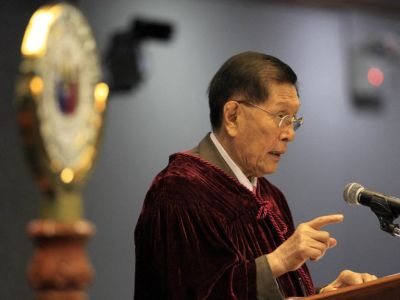US Middle East troubleshooter Denis Ross pursued efforts Thursday to stem the tide of blood washing over the Palestinian territories after Israeli launched air strikes and slapped new economic sanctions against the Palestinians.
After bombarding targets across the West Bank overnight, including offices of Palestinian leader Yasser Arafat's Fateh faction, Israel announced it was cutting off funds to the Palestinians as the deadly violence showed no signs of letting up.
Israeli Prime Minister Ehud Barak said there was no "miracle solution" to the bloody seven-week conflict and said any resumption of the peace talks could only happen once the violence was halted.
"Israel will continue to lead this fight, which has been imposed on us, all the while keeping open to a resumption of negotiations with the Palestinians. But this cannot happen without a significant drop in the level of violence."
Arafat said after meeting Ross in Gaza he hoped peace talks could be revived before US President Bill Clinton leaves office in January.
"We have not to forget that President Clinton is insisting to achieve something before his departure," Arafat said after 90 minutes of talks with Ross, who had met with Barak late Wednesday.
Ross vowed Thursday that the United States would do all it could to restore the peace process, left in tatters by the weeks of violence that has claimed the lives of more than 230 people.
"One thing is very clear. We have got to change the environment if we are to be able to achieve what everybody wants," Ross told journalists.
"There is no military solution, only a political solution. We will do everything we can to try to improve the environment and everything to try to get back to the objectives, not only peacemaking but achieving peace," he added.
Barak last month declared a "time-out" in the seven-year Oslo peace process because of the unrest, although negotiations had been on hold since the collapse of the US-hosted Camp David summit in July.
"There is too much suffering, too many victims, too many casualties, too much pain," said Ross.
Barak is facing mounting pressure -- from Jewish settlers, the right wing, top army brass and even his own ministers -- to take a tougher line with the Palestinians after more Jewish blood was spilled.
"If we thought that 2,000 Palestinian deaths instead of the 200 now would really solve the situation we would act in that direction," Barak told Israeli public radio.
"But there is no miracle solution, because a settlement can only be found around the negotiating table," he said.
In the latest Israeli bombardment, combat helicopters pounded several West Bank towns and villages, including targets of what Israel terms the Tanzim militia of Arafat's Fateh faction.
A German doctor became the first foreign casualty of the unrest. He was hit by a shell or a rocket in the village of Beit Jala near Bethlehem as he was leaving his home to help his neighbors whose house had been set ablaze in the attack.
Funerals were also being held across the West Bank and Gaza Strip for the nine Palestinians who died after stormy clashes on the 12th anniversary of the Arafat's symbolic declaration of independence in Algiers.
The Israeli strikes followed a meeting of Barak's security cabinet, which discussed measures in response to the killing of four Israelis Monday in shooting attacks.
Barak said the operation "was aimed at making the Palestinians understand that they will pay the price for violence and that they will gain nothing."
And in a new punitive measure, Barak said Israel had frozen the transfer of funds due to Arafat's self-rule authority.
"The money that was to have been transferred to the Palestinian Authority under the agreements concluded has not been for a few days and that will continue for as long as necessary," he told army radio.
Under economic accords, Israel pledged to return to the Palestinian authority customs duties and value added tax raised from products passing through Israeli territory on their way to the West Bank and the Gaza Strip.
VAT returned to the Palestinians amounts to some 320 million dollars a year.
Israeli authorities were also obliged to pay certain benefits to Palestinians who held jobs in Israel before the occupied territories were sealed off in early October.
Some 120,000 Palestinians who used to enter Israel every day for jobs have been out of work since the Palestinian territories were closed off.
Arafat lashed out at Barak over the decision which he said was putting the Palestinians in a "critical economic situation."
"It is a part of the war against us from Barak's side, as is also a war of rockets, planes, tanks." – JERUSALEM (AFP)
© 2000 Al Bawaba (www.albawaba.com)









